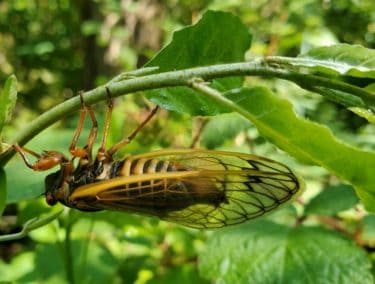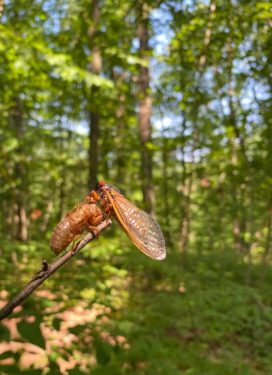nature’s flying hotdog
Brood X might sound like the name of the latest superhero movie but the emergence of this year’s 17-year cicadas has far more in common with a music festival than a team of super powered titans.

Every 17 years, Brood X cicada nymphs emerge from the ground, shed their skins, then fly, mate, lay eggs, and die—all within several weeks. While it may be intimidating when they arrive in large numbers, this is a situation where the bark is far worse than the bite. In fact, Brood X can’t bite, as they have no teeth, no stinger, only a straw that they use to suck up sap. They are slow, large, and defenseless.
To a bird, a cicada is like a delicious hot dog at a picnic. That is, if the hot dog was flying around the picnic very slowly. For birds, reptiles, fish, spiders, and other wildlife, the emergence of cicadas is an outdoor feast of epic proportions.
 So how does nature’s flying buffet survive? Cicadas use the power of numbers to make it as a species, emerging from the ground in precisely timed cycles to overwhelm predators with their numbers. This insures that, even if many are gobbled up, the brood reproduces, and the 17-year cycle continues. When cicadas die after a few weeks of singing, mating, and egg laying, they decompose into the soil and become a protein-rich compost that nurtures the trees for the next cicada generation.
So how does nature’s flying buffet survive? Cicadas use the power of numbers to make it as a species, emerging from the ground in precisely timed cycles to overwhelm predators with their numbers. This insures that, even if many are gobbled up, the brood reproduces, and the 17-year cycle continues. When cicadas die after a few weeks of singing, mating, and egg laying, they decompose into the soil and become a protein-rich compost that nurtures the trees for the next cicada generation.
Brood X can’t hurt you, but you can hurt them and other wildlife by using pesticides. Pesticides not only kill cicadas, it also harms the wildlife that eat cicadas. All you need to do to help wildlife is put up with the sounds of a summer celebration for a few weeks. Brood X is throwing their own music festival, and it only happens once every 17 years. So, let’s welcome our flying hotdogs, enjoy the music (or get some earplugs), and give wildlife the best summer of their lives.
